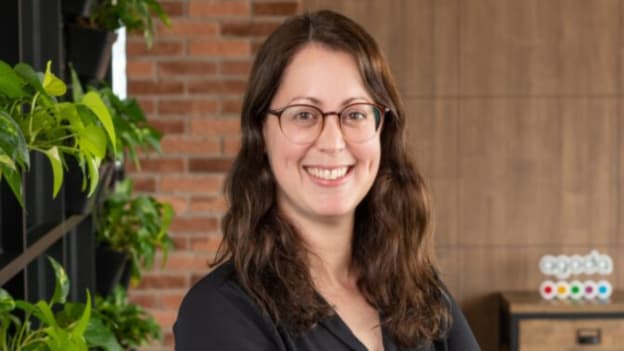Agoda’s Eliana Carmel on how to nurture an environment for innovation

A people-centric environment where individuals can thrive, unleash their potential, and contribute meaningfully to the collective goals and success of the organisation or community has become a necessity for organisations irrespective of the nature of the business.
Travel and tourism were hit hardest among industries when Covid halted everything, but now it is bouncing back to normal and the new challenge has become manpower. Creating a people-centric environment is now on the priority list for leaders in the industry. People Matters spoke to Eliana Carmel, Chief People Officer at Agoda on changes introduced by her organisation to attract and retain top talent.
In a post-pandemic world, the employees’ focus from where they work has changed to why they work. As an HR leader, what is your perspective on this shift?
I believe the pandemic has shone a light, both professionally and personally, on the things that matter most to an individual. When faced with surviving the realities of a global pandemic, and challenging experiences for the first time, you tend to look at the world differently. Values have shifted, and there’s more emphasis on spending time on work that matters or drives impact, with an organisation that values them equally for their contributions to the team and their individuality. I believe people have gotten more empathetic in this post-pandemic world and it’s important to reflect this shift in the office as well.
What is the current state of the hiring landscape in APAC's travel and tourism sector? What are your strategies to retain and attract the best talent amid the changing priorities of employees?
When travel returned, we had to increase our hiring numbers and address new requirements from high-in-demand tech talent as well as remote hiring and remote starters.
With the new initiatives we introduced during Covid, focusing on the wellbeing of our employees and our hybrid working model we were set up well and were able to attract the needed talent.
We firmly believe that people are our biggest strength, and at Agoda we name our department the ‘People team’ to reflect our people-centric approach and commitment to everything we do. We partner closely with the leadership team and stakeholders, to enable all managers to hire, inspire and retain top talent. We employ a strategic and data-driven approach to hiring and are especially focused on creating a collaborative culture that empowers our employees to be curious, learn by experimentation, and be their best. All of which are core Agoda values.
This includes ensuring our leaders have the right tools and information they need to be able to lead their teams effectively and at scale while implementing the correct frameworks to help them work towards their goals. Our tools vary from dashboards, employee performance data, industry benchmarking, rewards frameworks and more. This helps give various teams the tools to help them set targets and succeed within their own departments as well.
Additionally, continuous learning is a big focus at Agoda, and a large part of what we do entails enabling growth through an extensive range of practical, tailored learning programs and support to our manager and employees. Fostering a curious mind helps create a nurturing environment for innovation.
Apart from perks and compensation, the workforce wants good jobs, good leaders, and good companies. What innovations Agoda has brought at the leadership level to stay ahead of its competitors?
At Agoda, we always foster the culture of learning and innovation. We want to give our employees room to try new things, test & measure, make mistakes and learn from them. A ‘fail fast and learn fast’ approach we call it.
Recently, we launched a program called ‘Agoda Leap’, to provide an opportunity for employees of all levels to pitch and showcase innovative ideas to the leadership team, and more importantly learn and build new skills in this process. Everyone is welcome to pitch their ideas, every department, every role, and at every level.
It’s part of our goal to encourage a culture of entrepreneurship at Agoda, where every employee is empowered to generate innovative ideas, learn how to develop strategies, and maintain curiosity and ownership.
In previous years, we’ve had learning programmes where senior leaders came together to pitch ideas on what and how we can do better as an organisation. But we believe good ideas can come from anyone.
Entrepreneurship is a core value for us. A program like this encourages the team to generate innovative ideas, learn how to develop go-to-market strategies, and maintain curiosity and ownership over the work they do here. We also want to give all employees an equal chance to present their ideas and build confidence in their thinking, and to then carry that forward as they advance in their career. Game-changing ideas can come from anyone – even an entry-level employee brings a unique perspective as they view our processes with fresh eyes.
How do you see the evolving role of HR and talent leaders amid the challenges of layoffs and shifting work habits in the current economic climate?
The past few years have taught us that it’s important to be agile in our ways of working to accommodate the ever-changing market needs and trends. There is no one size fits all framework, but it can be useful to rely on data-driven insights to find efficient ways of working.
Workplace expectations and trends are forever evolving. We’re all learning first-hand as we transitioned from a full-WFH to hybrid-work. No organisation had the right answer and a playbook that we could have adopted.
As a team, we’ve had to be agile and data-driven, as we learn and adapted many best practices including our benefits, compensation and way of working to balance the needs of the organisation and the wants of the people. The challenge is to predict the market changes and trends and we do a lot of internal work to create models that will help decision making.
Leveraging the latest technologies can help with this as it allows enterprises to gain a better understanding of their organisation’s job and skills architecture and plan for future skills demand. Building a skills framework based on a unified skill language to better understand and identify diverse skillsets, spot hidden and identify skill gaps.
It is also important to enhance our approach to talent management, focusing on the empowerment of managers as they are the ones on the ground day to day, and providing the data, tools and trainings needed for management at scale. HR leaders need to synchronise talent acquisition, talent management and organisational skills mapping to create an agile and continuously growing workforce.
The human resource landscape is expected to be altered in 2023 in more ways than one. What should be the top priorities for HR leaders in the current year?
Upskilling leaders and managers, data-driven people team, what is important to employees today, DEI across employees' life cycle, and real estate in a hybrid world are our people trends for the year ahead factoring in the changing workplace landscape. As organisations grow, so do the expectations and responsibilities of people leaders. People leaders have a lot more on their plate. They’ve had to adapt and develop skills to be more authentic and empathetic, “human” leaders. Checking in with employees is not an occasional activity. With employees' shifting preferences, employee research is a priority. Simply “talking the talk” about DEI won’t cut it anymore, it’s time for real actionable plans.
Tech infusion is everywhere in the work culture. However, the human touch is believed to be always needed for tech. What is your thought on all the buzz around the ChatGPT for HR?
There has been so much talk about AI and its applications across industries. At Agoda, we see ourselves as a tech company first and foremost and a travel company second. In my time here, I have seen how technology can truly help us evaluate and analyse any situation better. It does not take away from people being able to do their jobs but rather enhances our skills. People are our biggest asset, and these revolutionary technologies can cause professionals to become more desired because they are much more productive. Freeing up their time to work on more meaningful work while technology crunches the numbers in the background. There is definitely a lot of buzz around it and it’s early to rush and adopt but we see it as a new space to explore and will be learning as we go. In the meantime, we are exploring some areas to use AI tools to enhance people processes such as employee resources, employee help desk, and learning.















